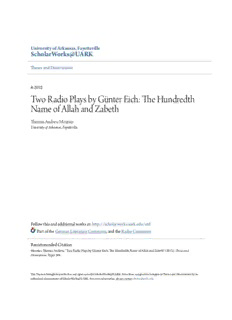
The Hundredth Name of Allah and Zabeth PDF
Preview The Hundredth Name of Allah and Zabeth
UUnniivveerrssiittyy ooff AArrkkaannssaass,, FFaayyeetttteevviillllee SScchhoollaarrWWoorrkkss@@UUAARRKK Graduate Theses and Dissertations 8-2012 TTwwoo RRaaddiioo PPllaayyss bbyy GGüünntteerr EEiicchh:: TThhee HHuunnddrreeddtthh NNaammee ooff AAllllaahh aanndd ZZaabbeetthh Thomas Andrew Meunier University of Arkansas, Fayetteville Follow this and additional works at: https://scholarworks.uark.edu/etd Part of the German Literature Commons, and the Radio Commons CCiittaattiioonn Meunier, T. A. (2012). Two Radio Plays by Günter Eich: The Hundredth Name of Allah and Zabeth. Graduate Theses and Dissertations Retrieved from https://scholarworks.uark.edu/etd/504 This Thesis is brought to you for free and open access by ScholarWorks@UARK. It has been accepted for inclusion in Graduate Theses and Dissertations by an authorized administrator of ScholarWorks@UARK. For more information, please contact [email protected]. TWO RADIO PLAYS BY GÜNTER EICH: THE HUNDREDTH NAME OF ALLAH AND ZABETH TWO RADIO PLAYS BY GÜNTER EICH: THE HUNDREDTH NAME OF ALLAH AND ZABETH A thesis submitted in partial fulfillment of the requirements for the degree of Master of Fine Arts in Translation By Thomas A. Meunier Indiana University – Purdue University at Indianapolis Bachelor of Arts in German, 2004 August 2012 University of Arkansas ABSTRACT This is a translation of two radio plays by Günter Eich, the most celebrated author in this genre. They have been translated from the original German into English. These two radio plays illustrate Eich’s examination of the limits of language in negotiating the chasm between the spiritual and physical worlds. This thesis is approved for recommendation to the Graduate Council. Thesis Director: John DuVal Thesis Committee: Geoffrey Brock Jennifer Hoyer THESIS DUPLICATION RELEASE I hereby authorize the University of Arkansas Libraries to duplicate this thesis when needed for research and/or scholarship. Agreed Thomas A. Meunier Refused Thomas A. Meunier ACKNOWLEDGMENTS I would like to gratefully acknowledge the guidance, support, and unfailing encouragement of the faculty and staff of the Department of English and Creative Writing at the University of Arkansas, particularly John DuVal and Geoff Brock of the program in Literary Translation. Special thanks are also due to the many students and guest translators I worked with under the auspices of the translation workshops during my MFA studies, some of whom helped to improve the translations presented here, and all of whom have made me a better translator, reader, and, I dare to hope, a better writer. Finally, I am indebted to the staff of the Graduate School for advice and help in the preparation of this thesis. DEDICATION This translation of Günter Eich’s radio plays is dedicated to those who, while yet unsure of their footing, continue in their individual searches for a spiritual basis of our physical existence. Though the goal may sometimes be unclear, though the ends may be unwittingly confused with the means, though the search itself may seem fruitless and hopelessly frustrated at times – there is comfort in the undeniable fact that more will always be revealed if we but continue on our “speechless, seeking trail.” TABLE OF CONTENTS I. INTRODUCTION 1 II. THE HUNDREDTH NAME OF ALLAH 5 III. ZABETH 63 IV. REFERENCES 106 I. INTRODUCTION Wir übersetzen, ohne den Urtext zu haben. Der Schriftsteller vor der Realität (1956) Günter Eich remains the undeniable maestro of the German radio play. Despite the ongoing accrual of years between current readers and Eich’s original context, despite the rapidly changing media of dramatic art, despite recent controversies surrounding Eich’s writerly activities in radio during the Third Reich, his reputation and accomplishments in the genre of the Hörspiel are undiminished. Though chiefly known outside Germany for his poetry – most notably his stark Inventur – Eich’s radio plays are as yet almost wholly untranslated, and thus inaccessible, to the English reading world. It is for this reason, as well as for a compelling personal attraction to these radio plays on the part of the current translator, that these English translations have been attempted. In brief, it is the belief of the translator that Eich’s radio- dramatic writings deserve a wider readership. To put it another way, it is my belief – as well as my experience – that English readers will discover in these radio plays much to value, for there are in them the seeds of reflection which will grow in contemplation to yield glorious fruit. Günter Eich’s name will always be connected with those of his famous – in some ways, his considerably more famous – co-members of Gruppe 47, the small but extraordinarily influential band of writers who tasked themselves with the resurrection, if any resurrection were possible after the totalitarian years, of German literature. These included writers such as Heinrich Böll, Günter Grass, and Ilse Aichinger, Eich’s future wife, in the early period, and expanded to count among their members and adherents Paul Celan, Martin Walser, Peter Handke, and many others. 1
Description: